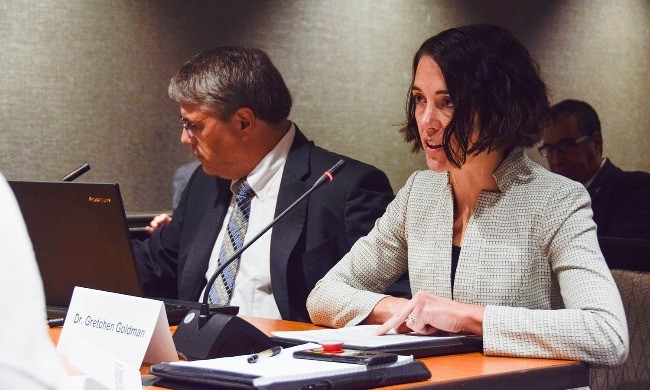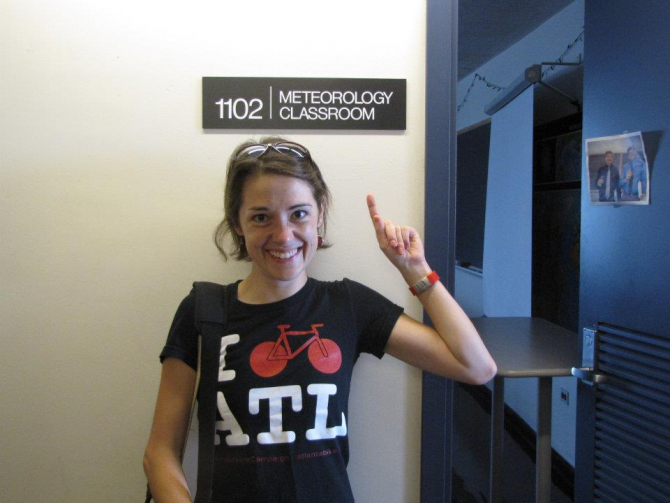News directly from Cornell's colleges and centers
Gretchen Goldman '06 named to White House environmental policy office
By Erin Philipson
Ever since her days as an undergraduate at Cornell University, Gretchen Goldman '06 has been drawn to the intersection of science and policy. Now she is helping to inform policy at the highest level as the assistant director for environmental science, engineering, policy and justice for the White House Office of Science and Technology Policy.
Goldman began the job in July and will serve a one-year term while on sabbatical from the Union of Concerned Scientists, where she is the research director for the Center for Science and Democracy.
Goldman, an atmospheric science major at Cornell, first became interested in the ways science impacts public policy during a course in the College of Architecture, Art, and Planning called Green Cities. The course revolved around how decisions made by a society impact the urban environment and its intersection with nature.
“That course really made me think about the career options that could combine science and policy, allowing me to lead, organize, and communicate while also using technical skills,” said Goldman.
After completing an externship with a Cornell alumnus working on air quality policy for transportation at the Federal Highway Administration, Goldman was set on working in policy and advocacy in some capacity.
“It was this incredibly valuable experience because I got to meet all these people with technical degrees that were doing all kinds of neat things that made concrete impacts on the world,” said Goldman. “It opened my eyes to the world of Washington, D.C., and public service, and all the potential there is to use science for public good.”
After finishing her undergraduate degree at Cornell and her graduate degree at Georgia Tech, Goldman found herself back in Washington, reconnecting with the Cornell alumnus she worked with years ago and landing a role at the Union of Concerned Scientists.
For nearly a decade at UCS, Goldman has led research efforts on issues such as scientific integrity, fossil energy production, climate change, and environmental justice. A large part of her work involves speaking with the media, meeting with decision-makers at federal agencies or on Capitol Hill, and testifying to Congress on environmental topics.
Goldman has worked on numerous influential campaigns during her career, including an effort to document what she describes as escalating attacks on science in recent years. She has also offered proposals that have subsequently been adopted by the Biden Administration.
Since 2008, the Union of Concerned Scientists has recommended the U.S. president make their science advisor a member of the cabinet in order to keep science at the foreground of decision making at the national level. “When President Biden took office, he did this – giving science a literal and figurative seat at the table,” said Goldman.
Goldman is also active in several other organizations, including sitting on the board of 500 Women Scientists, a grassroots organization dedicated to building an inclusive scientific community. Through this group, she led efforts to support mothers in STEM fields throughout the COVID-19 pandemic by providing recommendations to employers and providing resources to help women advocate for themselves. Goldman has also served as an expert on the Public Health Rulemaking of the California Department of Conservation’s Geologic Energy Management Division, chaired the Air and Climate Public Advisory Committee for the Metropolitan Washington Council of Governments, and served on the UNESCO/AAAS Consultation Group on the U.S. science ecosystem.
Goldman is passionate about the role of science in policy decisions, noting that it is critical for making equitable choices. “The use of science ensures that we’re able to make the best decision possible,” she said. “It reduces bias in how decisions are made and ultimately, policy outcomes are better if science and evidence are involved.”
Author's note: For this article, Goldman spoke in her personal capacity, not on behalf of her employers. Erin Philipson is a communications specialist for the Department of Earth and Atmospheric Sciences.
Media Contact
Get Cornell news delivered right to your inbox.
Subscribe


